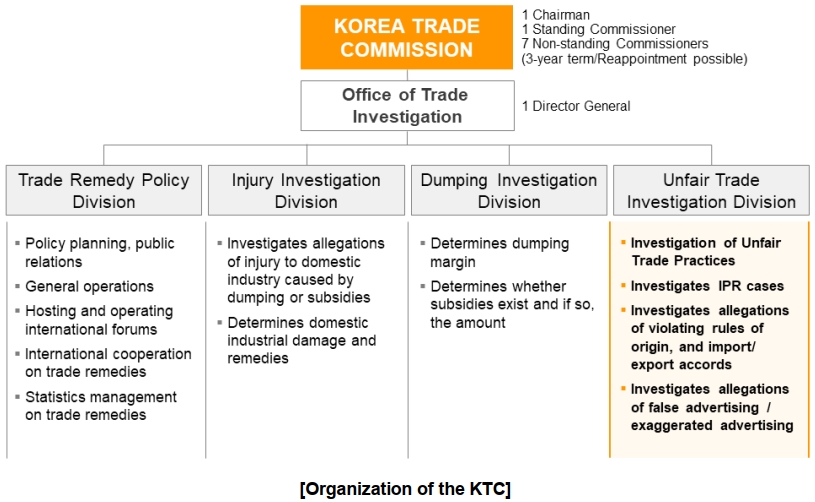The Korea Trade Commission (KTC) is a quasi-judicial government agency responsible for various enforcement measures relating to imports and exports, which has become increasingly important as a means for effective protection of intellectual property in Korea, similar in many ways to the U.S. International Trade Commission. This paper summarizes the structure and operation of the KTC, including some recent developments and statistics relating to the KTC.
1. KTC's Unfair Trade Practice Investigation System
The KTC is responsible for enforcing the Act on the Investigation of Unfair International Trade Practices and Remedy against Injury to Industry (the "UITIA"), including investigating potential injury to domestic industry due to unfair international trade practices, reviewing and determining the extent of such injury, and recommending remedial measures, and publicly announcing resolution of such investigations. The unfair trade practices investigated by the KTC can include the infringement of intellectual property rights by imported and exported goods.
The KTC comprises nine commissioners, including one chairperson. The Unfair Trade Investigation Division of the KTC is responsible for conducting investigations of imports and exports of goods that unfairly infringe intellectual property rights, and to take corresponding remedial measures.

The UITIA prohibits the following acts as types of unfair international trade practices:
- Any act of supplying goods, etc. that infringe patent rights, utility model rights, design rights, trademark rights, copyrights, neighboring copyrights, program copyrights, layout-design rights of semiconductor integrated circuits, geographical indications, or trade secrets protected by the statutes of the Republic of Korea or the treaties to which the Republic of Korea is a party, or any act of importing and selling such goods, etc. into the Republic of Korea from abroad, or any act of exporting such goods, etc. from the Republic of Korea or manufacturing such goods in the Republic of Korea for export;
- Any act of exporting or importing goods with a false or misleading mark of origin, goods whose mark of origin is damaged or changed, or goods subject to marking of origin without such mark;
- Exporting or importing goods, etc. with false or exaggerated labeling of quality, etc.;
- Interfering with imports or exports to foreign countries through damaging Korea's credibility based on importing/exporting goods, etc. significantly different from the terms and conditions of a contract for import/export, or the arising of disputes relating to the performance of an import/export contract.
Either at the request of a party or ex officio, the KTC can investigate unfair international trade practices and issue an order for corrective action (such as prohibiting or destroying infringing products) and/or administrative fines for such practices, but cannot award damages. An objection to a decision may be filed to the KTC by the respondent in an investigation, while either the respondent or petitioner may file an administrative appeal of a decision to the Administrative Appeals Commission, or an administrative litigation to the Administrative Court to review a decision by the KTC.
Some important aspects of the KTC's system for investigating unfair international trade practices are as follows:
- The KTC has broad jurisdiction to investigate violations of a wide scope of intellectual property rights, including copyrights, semiconductor integrated circuit layout design rights, and trade secrets in addition to patents, utility models, designs, and trademarks.
- The KTC will make a determination as to whether there are unfair trade practices within as little as six months from commencing the investigation, and because KTC proceedings are structured as investigations by the agency rather than dispute proceedings between parties, they are relatively lower cost than the courts or the Intellectual Property Trials and Appeals Board for conducting IP disputes.
- Once an investigation determines there is irreparable harm, remedies such as suspension of unfair trade practices can be promptly obtained through provisional measures (similar to an injunction against infringement in an infringement action).
- In the event goods identical to goods determined to be infringing by the KTC are imported/exported by a third party, remedies can be promptly obtained through a confirmation system for goods subject to judgment, without needing a separate investigation proceeding.
In view of the above, the KTC provides for relatively speedy remedies to address infringement of intellectual property rights by imported or exported goods compared to other venues for enforcing IP rights, which may be especially effective for protecting companies' interests.
2. Recent Developments
In July 2024, the KTC expanded its fact-finding procedures for IP infringement cases from the existing method of investigation based mainly on submitted documents as evidence, to add investigation based on witness statements from relevant parties and fact-finding pledges. The KTC also introduced new regulations to facilitate submission of evidence claimed to be trade secrets and improve the security of management of data, in order to better facilitate the resolution of disputes between parties on technical issues involving trade secrets.
The KTC is currently reviewing introducing procedures to limit access to trade secrets in an investigation to counsel for the petitioner and respondent only (similar to attorneys' eyes only designations for evidence in the U.S., or the data room system in the EU), for the purpose of expediting investigations involving trade secret information and enhancing the rights of companies to defend themselves. The KTC is also making efforts to establish better cooperation with research institutes that have advanced equipment or highly capable researchers in order to make faster and more accurate judgments in technical cases.

As the above table shows, these efforts seem to have encouraged multinational companies to apply more often to the KTC to investigate IP infringement by Chinese, Korean, and Japanese companies, as reflected in recent filing numbers. Indeed, the KTC's efforts in 2024 seem to have resulted in the highest number of investigations initiated in the past 10 years.
Related Topics








